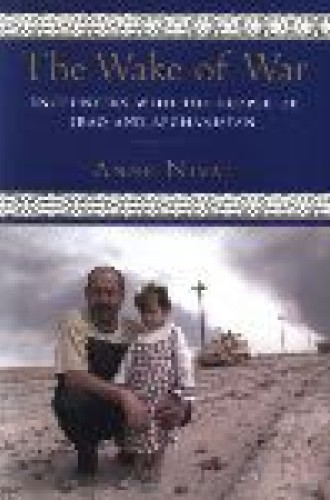The Wake of War
The influential theological ethicist H. Richard Niebuhr taught that before asking “What shall I do?” we ought to ask “What is going on?” This informative and disquieting book by award-winning French journalist Anne Nivat addresses this crucial question by conveying what is happening in the lives of the Afghan and Iraqi people, who continue to struggle for security and hope in the wake of the U.S. military actions in their countries.
Nivat provides us with a fine example of immersion journalism and deftly brings out the human face of “the other.” Instead of being embedded with the occupying troops, Nivat spent 12 weeks in each country in remote villages as well as major cities, traveling by taxi, dressing like the ordinary people (even sometimes wearing a burka), and being welcomed into their homes for meals and conversation.
In Afghanistan after the December 2001 U.S. “victory” (the scare quotes are hers), Nivat traveled from north to south, meeting with former warlords, mujahideen, Taliban, and everyday persons caught in the crossfire of these groups, which are still vying for power under the shadow of the U.S. military presence. Similarly, she journeyed from north to south in Iraq after the April 2003 U.S. military “victory” there, meeting with Kurds, Turkomans and Iraqis in Baghdad and southern Iraq. Both Sunni and Shi‘ite Muslims showed her hospitality as they told graphic stories and conveyed their candid reflections.
Nivat introduces us to Hamid Majd Ahmad, a former Iraqi soldier in Saddam Hussein’s Republican Guard, who admits, “As poor foot soldiers, we couldn’t do anything against the all-powerful enemy air force.” Similarly, Hussein Jamil Ghalif, who was a member of the Baath Party, asks, “What could I have done against their firepower equipped as I was with only my service weapon?” An admiral in the Iraqi fleet based in Basra, Adnan Karim Bhaya, remarks, “How can you defend yourself with a Kalashnikov against tanks and planes? It wasn’t a war, it was a farce.”
Nobody disagrees that the U.S. military interventions were easily won in each of these countries, but most believe that each invasion has had “long-term consequences that are hard to make sense of.” Huge billboards that previously displayed images of Saddam now stand “gray and empty, symbolizing the uncertainty of Iraq’s future.” The people of Afghanistan have similar uncertainty about their own country’s future.
Although these interviews were conducted a few years ago, Nivat’s hosts anticipated many of the problems that are just now receiving attention in U.S. media. In both countries people aired their doubts and suspicions about the real intentions of the U.S. in the region. Iraqis and Afghans alike worried about the fault lines between regions, ethnic groups and religious sects. Many of the billboards in southern Iraq now hold portraits of Shi‘ite religious leaders, something that concerns Sunnis and secular Shi‘ites alike. From university professors to merchants, people expressed their fear that civil war would break out in Iraq and that the Taliban would regain a foothold in Afghanistan.
In both lands people confessed that they did not understand democracy and human rights, but they agreed about the need to create jobs, rebuild schools and hospitals, and restore electricity and water supplies. While nearly everyone was grateful to the U.S. for removing Saddam and the Taliban from power, the view of Tariq al-Etharei, director of the theater department at Basra University, is fairly representative: he said he doesn’t understand why the U.S. troops are doing such a poor job of “conquering hearts.”
How ought people of faith who are citizens of the U.S. respond to these accounts? A number of Nivat’s interviewees raise questions about just war criteria such as right intent and noncombatant immunity, which fall, respectively, under the traditional categories of jus ad bellum (justice in going to war) and jus in bello (justice in the conduct of the war). Nivat’s account should also fuel Christian ethicists’ nascent explorations in another category, jus post bellum (justice after war). This would involve putting our money and resources where our collective mouth is to bring about a just and orderly peace.
In the book’s brief conclusion, Nivat offers some of her own reflections, most of them critical. Although occasionally she saw signs of hope beneath the rubble, things seemed to be spiraling out of control in Afghanistan and Iraq. “Even so,” she writes, “President George W. Bush stubbornly continues to hide his head in the sand, claiming that today we live in a more secure world than we did in 2001.” The Hebrew prophet Jeremiah observed: “‘Peace, peace!’ they say, though there is no peace.” Hopefully, we will not allow this false peace to be the final word.





